
TikTok's Comeback: What It Means for America's Tech Landscape
IndependentReport – TikTok’s journey in the United States has been nothing short of dramatic. From facing outright bans and being labeled a security threat to negotiating its way back onto American soil, the app’s resurgence marks a turning point in the country’s tech and political landscape. But what does TikTok’s comeback mean for the future of technology and policy in America?
As one of the most downloaded apps globally, TikTok’s presence in the U.S. has sparked debates about data privacy, national security, and tech innovation. Now that it has regained its foothold, TikTok’s return highlights not only the influence of foreign technology but also the complexities of regulating global platforms in a politically charged environment.
TikTok, owned by Chinese company ByteDance, became a household name due to its unique ability to create viral content. However, concerns about data collection practices and its ties to the Chinese government led to increased scrutiny. In 2020, the Trump administration attempted to ban the app, citing national security risks. This sparked widespread debate, lawsuits, and an intense negotiation process that ultimately kept TikTok operational in the U.S.
Fast forward to 2025, TikTok’s comeback is a testament to the app’s resilience and the evolving nature of tech regulation. Recent changes in leadership and stricter compliance with U.S. data protection laws have helped rebuild trust, allowing the platform to reestablish its dominance in the social media market.
TikTok’s return to the U.S. brings significant implications for the tech landscape, reshaping how global platforms operate and interact with domestic regulations.
One of the biggest controversies surrounding TikTok is its handling of user data. Critics argue that the app’s ties to ByteDance present a risk of data being accessed by the Chinese government. To address these concerns, TikTok has pledged to store American user data exclusively on U.S.-based servers and has partnered with Oracle for data management. This move sets a precedent for how foreign-owned platforms can navigate stringent regulatory frameworks in the U.S.
TikTok’s innovative short-form video format has forced competitors like Instagram (Reels), YouTube (Shorts), and Snapchat (Spotlight) to adapt quickly. TikTok’s comeback not only solidifies its position as a trendsetter but also increases competition in the tech industry. This could drive more innovation, benefitting creators and users alike.
TikTok’s return underscores the complexities of balancing innovation with national security. Its case has spurred discussions about creating clearer regulations for foreign-owned tech companies operating in the U.S. Lawmakers are now under pressure to strike a balance between protecting user data and fostering a competitive tech ecosystem.
READ MORE : Saif Ali Khan’s Condition Post-Stabbing Incident in Mumbai
For creators, TikTok’s comeback is nothing short of a victory. The platform’s algorithm, known for its ability to make content go viral, has become a vital tool for influencers, brands, and small businesses to reach a wider audience.
Businesses that rely on TikTok for marketing now have a renewed opportunity to connect with the app’s massive user base. With features like TikTok Shop and in-app advertising, companies can capitalize on the platform’s return to drive sales and build brand awareness.
Moreover, TikTok’s emphasis on creativity and engagement has transformed the way content is consumed, setting new standards for user interaction in digital spaces.
While TikTok’s comeback is a significant achievement, challenges remain.
TikTok must navigate these hurdles carefully to ensure its continued success in the U.S. market.
TikTok’s return highlights a larger issue: the need for comprehensive tech regulation. The U.S. lacks a unified framework for managing foreign tech companies, leading to inconsistent policies and enforcement. TikTok’s comeback serves as a wake-up call for policymakers to create a fair and transparent regulatory environment that fosters innovation while addressing legitimate security concerns.
TikTok’s resurgence in the U.S. marks a pivotal moment in the intersection of technology, policy, and global influence. TikTok’s comeback not only showcases the platform’s resilience but also sheds light on the evolving challenges of regulating foreign-owned tech in a globalized world.
For creators, businesses, and policymakers, TikTok’s return is a reminder of the app’s profound impact on the digital landscape. As the platform continues to thrive, it will undoubtedly shape the future of social media, innovation, and regulation in America and beyond.